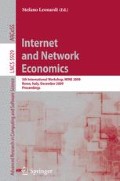Abstract
We are interested in mechanisms that maximize social welfare. In [2] this problem was studied for multi-unit auctions and for public project problems, and in each case social welfare undominated mechanisms were identified. One way to improve upon these optimality results is by allowing the players to move sequentially. With this in mind, we study here a sequential version of the Bailey-Cavallo mechanism, a natural mechanism that was proved to be welfare undominated in the simultaneous setting by [2]. Because of the absence of dominant strategies in the sequential setting, we focus on a weaker concept of an optimal strategy. We proceed by introducing natural optimal strategies and show that among all optimal strategies, the one we introduce generates maximal social welfare. Finally, we show that the proposed strategies form a safety level equilibrium and within the class of optimal strategies they also form a Pareto optimal ex-post equilibrium.
Access this chapter
Tax calculation will be finalised at checkout
Purchases are for personal use only
Preview
Unable to display preview. Download preview PDF.
References
Aghassi, M., Bertsimas, D.: Robust game theory. Mathematical Programming 107, 231–273 (2006)
Apt, K.R., Conitzer, V., Guo, M., Markakis, V.: Welfare undominated Groves mechanisms. In: Papadimitriou, C., Zhang, S. (eds.) WINE 2008. LNCS, vol. 5385, pp. 426–437. Springer, Heidelberg (2008)
Apt, K.R., Estévez-Fernández, A.: Sequential pivotal mechanisms for public project problems, Computing Research Repository, CoRR (2008), http://arxiv.org/abs/0810.1383 ; To appear in SAGT 2009: 2nd Symposium on Algorithmic Game Theory
Ashlagi, I., Monderer, D., Tennenholtz, M.: Resource selection games with unknown number of players. In: AAMAS 2006: Proceedings 5th Int. Joint Conf. on Autonomous Agents and Multiagent Systems, pp. 819–825. ACM Press, New York (2006)
Bailey, M.J.: The demand revealing process: To distribute the surplus. Public Choice 91(2), 107–126 (1997)
Cavallo, R.: Optimal decision-making with minimal waste: Strategyproof redistribution of VCG payments. In: AAMAS 2006: Proceedings of the 5th Int. Joint Conf. on Autonomous Agents and Multiagent Systems, pp. 882–889. ACM Press, New York (2006)
Cavallo, R.: Efficiency and redistribution in dynamic mechanism design. In: EC 2008: ACM Conference on Electronic Commerce, pp. 220–229 (2008)
Clarke, E.: Multipart pricing of public goods. Public Choice 11, 17–33 (1971)
Guo, M., Conitzer, V.: Worst-case optimal redistribution of VCG payments. In: EC 2007: Proceedings of the 8th ACM conference on Electronic commerce, pp. 30–39. ACM Press, New York (2007)
Guo, M., Conitzer, V.: Better redistribution with inefficient allocation in multi-unit auctions with unit demand. In: EC 2008: Proceedings of the 8th ACM Conference on Electronic Commerce, pp. 210–219 (2008)
Guo, M., Conitzer, V.: Optimal-in-expectation redistribution mechanisms. In: AAMAS 2008: Proceedings of the 7th Int. Joint Conf. on Autonomous Agents and Multi Agent Systems, pp. 1047–1054 (2008)
Guo, M., Conitzer, V.: Undominated VCG redistribution mechanisms. In: AAMAS 2008: Proc. of 7th Int. Conf. on Autonomous Agents and Multi Agent Systems (2008)
Hartline, J., Roughgarden, T.: Optimal mechanism design and money burning. In: STOC 2008: ACM Symposium on Theory of Computing, pp. 75–84 (2008)
Krishna, V.: Auction Theory, 3rd edn. Academic Press, New York (2002)
Mas-Collel, A., Whinston, M.D., Green, J.R.: Microeconomic Theory. Oxford University Press, Oxford (1995)
Moulin, H.: Efficient, strategy-proof and almost budget-balanced assignment, Working Paper (March 2007)
Nisan, N., Ronen, A.: Algorithmic mechanism design (extended abstract). In: STOC, pp. 129–140 (1999)
Author information
Authors and Affiliations
Editor information
Editors and Affiliations
Rights and permissions
Copyright information
© 2009 Springer-Verlag Berlin Heidelberg
About this paper
Cite this paper
Apt, K.R., Markakis, E. (2009). Sequential Bidding in the Bailey-Cavallo Mechanism. In: Leonardi, S. (eds) Internet and Network Economics. WINE 2009. Lecture Notes in Computer Science, vol 5929. Springer, Berlin, Heidelberg. https://doi.org/10.1007/978-3-642-10841-9_46
Download citation
DOI: https://doi.org/10.1007/978-3-642-10841-9_46
Publisher Name: Springer, Berlin, Heidelberg
Print ISBN: 978-3-642-10840-2
Online ISBN: 978-3-642-10841-9
eBook Packages: Computer ScienceComputer Science (R0)

